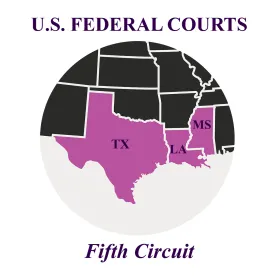The US Court of Appeals for the Fifth Circuit affirmed a take-nothing judgment and an attorney’s fees award against plaintiffs in a trade secret misappropriation and civil theft suit under Texas law, finding that the fee award did not need to be segregated to various claims. ATOM Instrument Corp. v. Petroleum Analyzer Co., L.P., Case Nos. 19-29151, -20371 (5th Cir. Aug. 7, 2020) (Southwick, J.). The Court also remanded for an additional award of appellate attorney’s fees.
Olstowski was a consultant for Petroleum Analyzer Co., L.P. (PAC), during which time he developed a krypton-chloride-based excimer lamp to detect sulfur with ultraviolet fluorescence. Although he developed the lamp independently, he used PAC resources to test the technology. Olstowski and PAC negotiated but failed to agree on licensing. Olstowski founded ATOM Instrument to assist him in the licensing discussions. Subsequently, PAC filed a declaratory judgment action in Texas court alleging that it owned the lamp technology. The state court ordered the claim to arbitration. The arbitration panel declared Olstowski the owner of the technology and enjoined PAC from using it. The state court confirmed the arbitral award, and a Texas appellate court upheld the confirmation order.
PAC thereafter developed a new sulfur-detecting excimer lamp called MultiTek that also used krypton-chloride with UV fluorescence. Olstowski and ATOM filed in state court for contempt of the injunction, but the state court denied the contempt motion as moot because PAC had ceased selling MultiTek.
ATOM filed for bankruptcy the following year. Olstowski and ATOM initiated a district court proceeding against PAC alleging misappropriation of trade secrets, unfair competition and civil theft. After holding a bench trial, the court found that MultiTek did not practice Olstowski’s technology and therefore entered a take-nothing judgment in favor of PAC. The district court also awarded attorney’s fees to PAC under a provision of the Texas Theft Liability Act (TTLA) that awards fees to prevailing parties. Olstowski and ATOM appealed both issues, and PAC sought an award of its appellate attorney’s fees.
As to liability, ATOM argued that the district court erred in finding that the MultiTek lamp did not practice Olstowski’s technology. ATOM characterized the error as a legal one regarding interpretation of the arbitral award, but the Fifth Circuit held that “whether one company used another’s protected technology” is a factual question for which Olstowski and ATOM had failed to carry the burden of proof at trial. ATOM further argued that the district court had ignored the alleged law of the case in deviating from the scope of technology defined in the arbitral award, but the Court again rejected ATOM’s argument because the district court had explicitly stated that the description of Olstowski’s technology in the arbitral award remained in effect.
As to the award of attorney’s fees, ATOM argued that the district court had not appropriately segregated fees related to the TTLA claim from those related to other claims. Applying Texas law, the Fifth Circuit affirmed that the TTLA claim was sufficiently related to the other claims in the case that the fees need not have been segregated. Accordingly, it affirmed the award of $1.3 million in attorney’s fees to PAC.
Turning to PAC’s request for appellate attorney’s fees, the Fifth Circuit noted that under Texas law, a statutory award of attorney’s fees to a prevailing party extends to appellate fees. ATOM argued that PAC had waived appellate attorney’s fees because it had failed to seek such fees in the trial court, citing a Texas rule that requires a prevailing party to move for such fees as a placeholder in advance of appeal. The Court rejected ATOM’s argument, holding that the Texas rule is a procedural one not applicable in federal courts, and further, that PAC had properly sought fees under the Fifth Circuit’s local rules. Accordingly, it remanded to the trial court for an initial determination of appellate attorney’s fees to be further awarded to PAC.
Practice Note: Pleading more claims is not always better, although it may have been risk-free as a practical matter in this case. While the plaintiffs’ choice to plead civil theft under the TTLA has nominally cost them $1.3 million and counting, PAC’s practical ability to recover is uncertain given ATOM’s bankruptcy.



 />i
/>i

